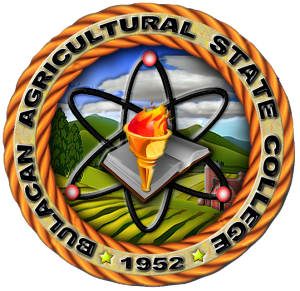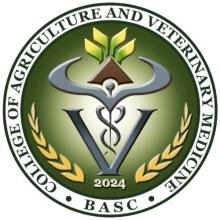College of Agriculture and Veterinary Medicine
Brief History
The first tertiary curricular offering of BASC, former known as BuNAS was started in the year 1960, the two-year Associate in Agriculture (AA) was the pioneer course being offered. It was ended in the year 1967. From 1962 up to the present, Bachelor of Science in Agriculture (BSA) was offered together with other courses such as Associate in Agricultural Technician (AAT) in the year 1974 – 2002 and Associate in Animal Science (AAS) in the year 1993 – 2004. However, BSA major in Agronomy was started to offer from 1962 up to 1989 while BSA major in Animal Husbandry was offered from 1966 up to 1991. Then, from 1980 to 2011 BSA major in Agronomy was changed into Crop Science and Animal Husbandry was changed into Animal Science. Additional major of BSA such as Agricultural Extension from 1985 – 2004 and Agricultural Economics from 1997 – 2006 were also offered.
Bachelor of Science in Agricultural Education (BSAEd) major in Agronomy and Animal Husbandry was offered in the year 1980 and it was terminated in the year 2000. However, BSAEd major in Crop Science and Animal Science was ended in the year 2001 while BSAEd major in Technology and Home Economics was offered from 1996 up to 2008.
Bachelor of Science in Animal Husbandry (BSAH) was started to offer from 1999 up to 2010. It was a laddered course leading to Doctor of Veterinary Medicine but it was not materialized due to lack of laboratory tools, equipment and facilities to continue offering the course. BSAH course was gradually phased out until all students enrolled in the course were graduated.
Bachelor of Animal Science (BAS) has been offered in the year 2006 – 2020. During that time, Animal Science was removed as one of the major fields of study in BSA degree program to prevent confusion among students. The course attracts several enrollees but it was phased out gradually until all students enrolled in the course were graduated. It was close due to lack of Commission on Higher Education Memorandum Order (CHED CMO) to offer the program.
Soon, after phasing out the BAS degree program Animal Science was included again as one of the major field of studies in the Bachelor of Science in Agriculture degree program while BSA major in Horticulture was offered from 2018 to present. BSA major in Agricultural Extension was implemented in the year 2000 to present.
Then, additional major of BSA degree program with contents notation from CHEDRO3 has been added such as Crop Protection and Soil Science, since these are included in the CMO of BSA
Degree program but these were not yet offered due to lack of PhD graduates specialized on that particular field of study.
Master of Science in Agriculture (MSA) was offered in consortium with Tarlac College of Agriculture during the first semester of Academic Year 2004-2005 as one of graduate programs of the then Institute of Agriculture to present. It was implemented by virtue of Board of Trustees Resolution Number 04-313 dated 19 November 2004. Under this program, it has three majors Animal Science received the Certificate of Program Compliance from CHED effective Academic Year 2019-2020 issued on March 25, 2020 while Horticulture and Agricultural Extension received the Certificate of Program Compliance effective Academic Year 2020-2021 from CHED and it was issued on October 29, 2021.
In the year 2020, two additional agriculture related degree programs were offered, the Doctor of Veterinary Medicine DVM) and Doctor of Philosophy (PhD) in Agricultural Sciences major in Animal Science and Horticulture. The Certificate of Program Compliance for the Degree Doctor of Veterinary Medicine has been issued by the CHED effective Academic Year 2023-2024 dated April 4, 2023. However, the Doctor of Philosophy in Agricultural Sciences major in Animal Science and Horticulture are still in the process of complying the required documents for the issuance of Certificate of Program Compliance.
Due to the offering of two doctoral degree program, the Institute of Agriculture are now converted into College of Agriculture effective first semester of Academic Year 2019-2020.
College Goals
- To produce competent graduates who can overcome domestic and global challenges in agriculture and veterinary medicine; and
- To support veterinary and agricultural competitiveness and sustainability through the generation and promotion of new knowledge, innovative technologies, and viable enterprises.
College Objectives
General: To provide the students with the appropriate skills in agriculture and veterinary medicine that will develop proper values and attitude toward desirable work habits, and encourage them to engage in animal and crop production, become animal health experts, and able to conduct to conduct highly advanced relevant researches and extension for national development.
Specific:
The CAVM shall produce graduates that are expected to be:
- Competent agriculturists and veterinarians endowed with the capabilities set by professional regulatory bodies;
- Productive and updated practitioners that are able to utilize and develop new technologies; and
- True humanists who possess a clear understanding, training, and appreciation of veterinary and agricultural research, extension, training and production.
Programs Offered
- Bachelor of Science in Agriculture
Majors:
Crop Science
Animal Science
Horticulture
Soil Science
Crop Protection
Agricultural Extension
Agricultural Economics and Marketing
Doctor of Veterinary Medicine - Master of Science in Agriculture
Majors:
Animal Science
Horticulture
Agricultural Extension - Doctor of Philosophy in Agricultural Sciences
Majors:
Animal Science
Horticulture
Contact Person
JULITA P. MENDOZA
Dean, College of Agriculture and Veterinary Medicine
(044) 697-1722
basc.college.of.agriculture52@gmail.com

